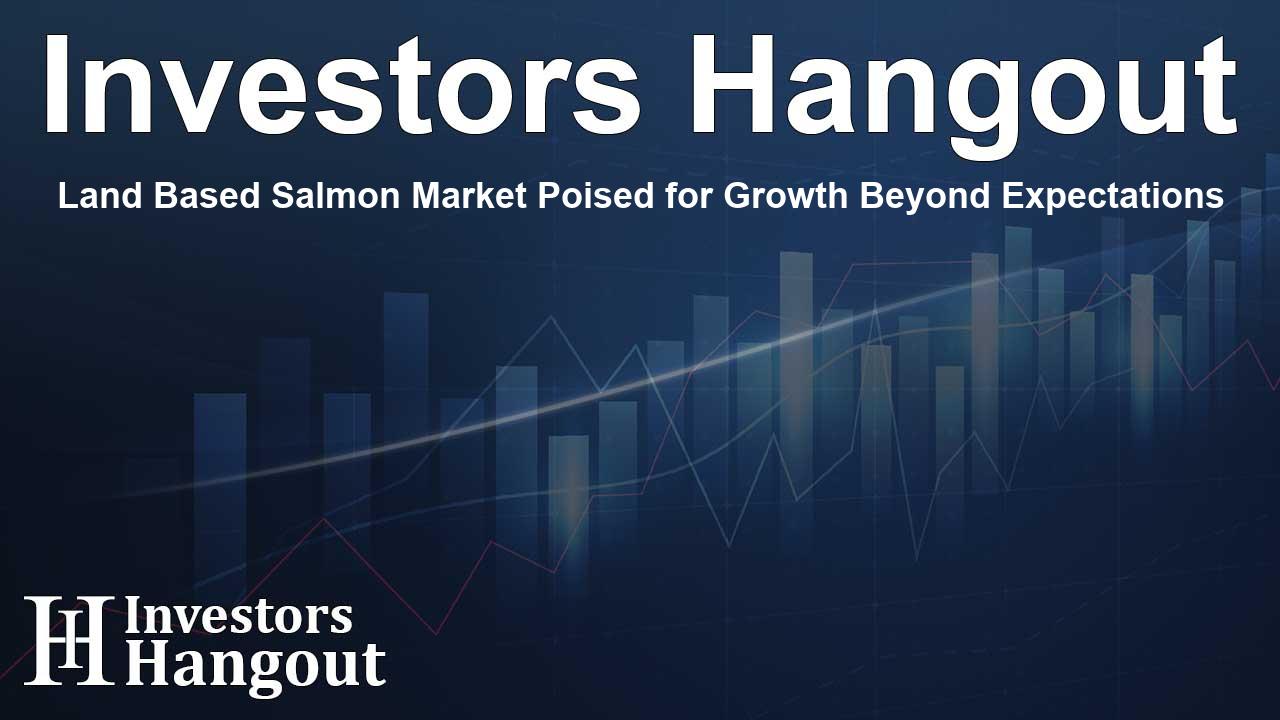Land Based Salmon Market Poised for Growth Beyond Expectations

Growth of the Land Based Salmon Market
The Land Based Salmon Market is experiencing a transformative shift fueled by rising consumer demands for sustainable seafood. This trend is largely attributed to innovative advancements in recirculating aquaculture systems (RAS) and growing awareness surrounding food safety and environmental sustainability. As more people become conscious of their food choices, land-based salmon farming emerges as a vital alternative to traditional sea-based methods.
Advantages of Land-Based Salmon Farming
Land-based salmon farming provides a controlled environment, reducing ecological disruption compared to traditional fishing practices. This sustainable approach minimizes the impact on marine ecosystems while ensuring a consistent supply of high-quality salmon for consumers. Additionally, recent investments in aquaculture technologies and supportive government policies are fostering the market's growth.
Demand for Sustainably Farmed Seafood
As the demand for sustainably sourced seafood rises globally, the Land Based Salmon Market is well-positioned to supply a growing consumer base. Producing salmon in controlled land-based systems fosters stronger biosecurity measures that contribute to healthier fish stocks and better-quality products. The shift towards antibiotic-free seafood resonates with health-conscious consumers looking for safe, traceable food sources.
Technological Innovations Enhancing Production
Technological innovation, particularly advances in RAS, plays a crucial role in the scalability and efficiency of land-based salmon farming. These sophisticated systems allow for water to be filtered and reused continuously, drastically reducing resource consumption. Real-time monitoring of conditions optimizes salmon growth, leading to increased productivity and lower operational costs.
Growing Global Appeal
The appeal of land-based salmon farming extends beyond environmental benefits; it aligns with evolving consumer preferences in various global regions. In markets such as North America and Europe, demand for responsibly farmed salmon is surging, driving investment into advanced farming systems. Companies are expanding operations while also ensuring compliance with strict sustainability regulations, which enhances their competitive edge.
Investment Trends in the Aquaculture Sector
Strategic investments in large-scale land-based salmon farming are becoming more prevalent as key industry players seek to capitalize on the sustainable seafood trend. Companies are dedicating resources toward state-of-the-art RAS facilities, enhancing their production capabilities, and building necessary infrastructure. These moves not only increase output but also build resilience against market fluctuations and supply chain disruptions.
Regulatory Impacts on the Market
Government regulations increasingly favor sustainable aquaculture practices, providing a stronger foundation for the Land Based Salmon Market. Regulatory bodies across various regions are implementing guidelines that encourage eco-friendly systems and bolster the industry's growth. Many governments offer incentives for eco-conscious practices, creating a conducive environment for market expansion.
Challenges and Opportunities
As the Land Based Salmon Market continues to grow, it faces both challenges and opportunities. While the initial investments are often significant, the long-term viability and profitability of land-based farming are increasingly appealing to stakeholders. Competition among established aquaculture firms, startups, and technology providers is driving innovation and improving operational efficiencies.
Positioning for Future Success
Market players are focusing on brand differentiation, product quality, and sustainable practices to secure a competitive edge. With an emphasis on emerging opportunities in regions like Asia-Pacific and the Middle East, forward-thinking companies are poised to reap the benefits of early engagement in these growing markets.
Conclusion
The Land Based Salmon Market is not just a trend; it's a growing revolution in how we farm fish sustainably. With advancements in technology, increasing consumer awareness, and regulatory support, the future of salmon farming is bright. Companies are encouraged to embrace innovative practices and capitalize on this movement toward sustainable seafood.
Frequently Asked Questions
1. What is driving the growth of the Land Based Salmon Market?
The growth is primarily driven by increasing consumer demand for sustainable seafood, advancements in aquaculture technology, and rising awareness about food safety.
2. How do recirculating aquaculture systems (RAS) work?
RAS technology enables water to be filtered and reused continuously, allowing for a more controlled and efficient farming environment.
3. What are the environmental benefits of land-based salmon farming?
Land-based farming minimizes ecological disruption, reduces carbon emissions, and communicates a commitment to sustainable practices, enhancing overall fish health.
4. How are governments supporting sustainable aquaculture?
Governments are implementing strict guidelines and incentives to promote environmentally friendly aquaculture practices, ensuring compliance and encouraging investment.
5. What challenges face the Land Based Salmon Market?
Key challenges include significant initial investment costs, competition among players, and the need for continuous innovation to meet evolving consumer demands.
About The Author
Contact Dominic Sanders privately here. Or send an email with ATTN: Dominic Sanders as the subject to contact@investorshangout.com.
About Investors Hangout
Investors Hangout is a leading online stock forum for financial discussion and learning, offering a wide range of free tools and resources. It draws in traders of all levels, who exchange market knowledge, investigate trading tactics, and keep an eye on industry developments in real time. Featuring financial articles, stock message boards, quotes, charts, company profiles, and live news updates. Through cooperative learning and a wealth of informational resources, it helps users from novices creating their first portfolios to experts honing their techniques. Join Investors Hangout today: https://investorshangout.com/
The content of this article is based on factual, publicly available information and does not represent legal, financial, or investment advice. Investors Hangout does not offer financial advice, and the author is not a licensed financial advisor. Consult a qualified advisor before making any financial or investment decisions based on this article. This article should not be considered advice to purchase, sell, or hold any securities or other investments. If any of the material provided here is inaccurate, please contact us for corrections.
